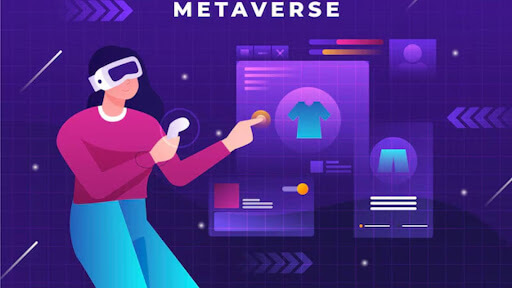 1-800-805-5783
1-800-805-5783 
The metaverse is a shared, community virtual environment emerging as the internet’s next frontier. This immersive digital universe has the potential to revolutionize how we interact, work, and entertain. Generative AI, a powerful tool that can create realistic and diverse content, plays a pivotal role in shaping the future of the metaverse.
The global metaverse market was valued at $47.48 billion in 2022 and is anticipated to increase to $678.8 billion by 2030 at a CAGR of 39.4%. By leveraging AI’s ability to generate realistic worlds, characters, and narratives, developers can create truly immersive and personalized experiences.

“Generative AI” is a branch of AI that focuses on creating original content, such as pictures, music, and text. It employs advanced techniques like Generative Adversarial Networks (GANs) and Variational Autoencoders (VAEs) to generate realistic and creative outputs.
By 2030, approximately 25% of organizations are expected to actively use generative AI for metaverse content creation, from developing virtual worlds to automating narrative experiences.
Beyond the metaverse, Generative AI has applications in various fields, including:
Generative AI is transforming the creation of virtual worlds. Valued at $8.65 billion in 2022, it’s estimated to expand to $126 billion by 2030, with significant gaming, marketing, and virtual reality applications. AI can drastically reduce development time and expenses by automating numerous world-building tasks.

AI-powered virtual and augmented reality will make it more difficult to differentiate between the real and virtual worlds. Generative AI can produce incredibly immersive virtual worlds.
While Generative AI offers immense potential, it also raises ethical concerns:

The future of Generative AI in the metaverse is bright. New developments like AI-powered augmented and virtual reality will make distinguishing between the actual and virtual worlds harder. The metaverse can revolutionize gaming, education, healthcare, and other industries. As AI advances, we expect to see increasingly sophisticated and immersive virtual worlds.
By 2025, 80% of new video games are anticipated to use some form of procedural generation powered by AI, helping to lower development costs and expand world complexity. The potential of AI-powered virtual worlds is immense. By embracing the power of Generative AI, we can create a future where the boundaries between the physical and digital realms are seamlessly intertwined.
1. What role does Generative AI play in the metaverse?
Generative AI creates realistic and dynamic content in the metaverse, such as virtual landscapes, characters, and objects. It also enables real-time interactions, personalized experiences, and scalable world-building.
2. How does Generative AI improve virtual world design?
It automates the creation of high-quality assets like textures, environments, and animations, reducing development time and costs. AI can also adapt virtual spaces to user preferences, ensuring unique and immersive experiences.
3. What are some practical applications of Generative AI in the metaverse?
Applications include virtual real estate design, creating NPCs with lifelike behaviors, generating storylines for gaming, and enabling personalized avatars that reflect users’ appearances and preferences.
4. What challenges are associated with using Generative AI in the metaverse?
Challenges include ensuring ethical content generation, managing computational resource demands, and maintaining user privacy while creating personalized experiences.
[x]cube has been AInative from the beginning, and we’ve been working with various versions of AI tech for over a decade. For example, we’ve been working with Bert and GPT’s developer interface even before the public release of ChatGPT.
One of our initiatives has significantly improved the OCR scan rate for a complex extraction project. We’ve also been using Gen AI for projects ranging from object recognition to prediction improvement and chat-based interfaces.
Interested in transforming your business with generative AI? Talk to our experts over a FREE consultation today!